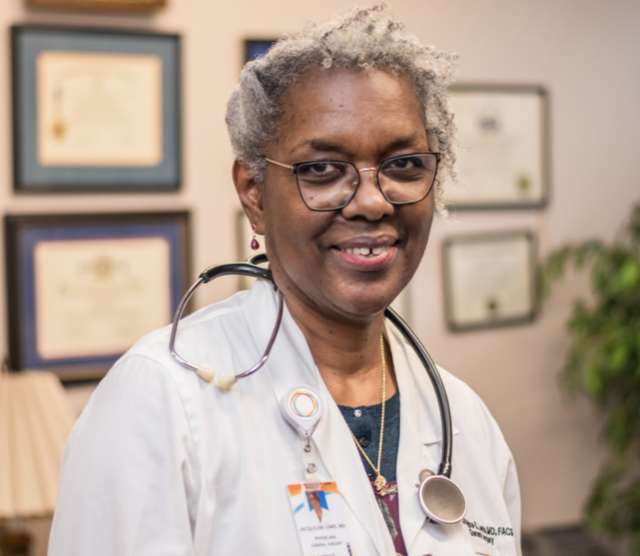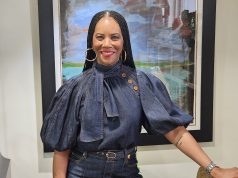
By Haley Wilson
The Birmingham Times
Jacqueline Lewis, MD, sits in her office at Princeton Baptist Medical Center in Birmingham. She is gracious and poised with her many credentials adorning the wall behind her, but what stands out most about Lewis is her modesty.
“I’ve never been one to boast or brag about what I do or have done,” she said. “I don’t like attention on me really. … I just do my job because I simply love to do it.”
With more than 39 years of experience in the medical field, Lewis, 67, currently operates her own general surgery practice at Princeton Baptist Medical Center. She also operates as chairwoman of the center’s division of general surgery and the credentialling committee.
“It has really been a blessing to have the opportunity serve. I have had the opportunity to help a lot of patients,” she said, pointing at a wall of thank-you notes from her patients throughout the years. “I feel like I have made a difference in my lifetime. I try to serve on different committees and help things operate as best as they can. … I have seen growth and improvement since [1992, when] I started here. I never really think twice about it, I just want to do my duty to help people.”
Lewis became the first Black female general surgeon in 1989 to practice general surgery in the state of Alabama and is one of the few Black female surgeons in the U.S.
“[It’s an] opportunity for young Black girls and boys to realize that they can do whatever they set their hearts on doing and they should not let obstacles stop them,” Lewis said. “Obstacles may be placed in your path, but you have to stay focused and excel at what you do. … [To succeed, you have to] have a vision of what you want to do, how you want to contribute, and what you feel your purpose in life is.”
“Home” in Birmingham
Lewis was born in Heidelberg, Germany. “My father made a career out of serving in the [Army], which means I was a military brat [because] we spent most of our time moving from place to place,” said the physician, who has lived in North Carolina, Georgia, and Japan.
In between each new location, Lewis always had a “home” in Birmingham.
“My father was from [the Woodlawn community], and in between the moves we could always pause and take a month or two to stay with family on my dad’s side,” she said.
In 1968, Lewis’s family officially relocated to Birmingham, where she attended the now-closed L. Frazier Banks High School after transferring from an integrated high school in Columbus, Georgia.
“[Banks High School] was mostly white at that time, and I was one of the first Black students,” she said. “There were two other Black children [at the school], and I was the third …”
“Before zoning became a thing, I was pretty much by myself and had to deal with obstacles from the start because I transferred from a military base [school]. … When I [started at] Banks High School, my father found out he was going to be stationed in Vietnam. The family was going to stay in Birmingham, his hometown, while he [went overseas]. … We didn’t follow him.”
One of the main obstacles Lewis had to overcome at the predominately white Banks was enrolling in honors classes.
“When I went to enroll at Banks, the counselor, [who was white], looked at my transcript and saw that I’d had straight A’s and had taken honors classes in math and English. She asked, ‘Was this a colored school you went to?’ … She figured that the grades I earned could have only come from a quote-unquote ‘colored school’—that was the word she used,” Lewis recalled.
“I was told, ‘No, you can’t enroll in those classes, they go fast. You probably should just enroll in the regular class.’ So, I spent my first year at Banks, ninth grade, in regular English and math classes, [which were] easy to me,” she said.
In her sophomore year Lewis was in honors math and English courses and enrolled in the National Honor Society. “I pretty much made straight A’s and few B’s all throughout high school. I even served as president of the girls Olympian Club, [a math club for high school students]. I was the only Black person in a lot of those organizations.”
Lewis graduated from Banks in 1972 and enrolled in the physical therapy program at the University of Alabama at Birmingham (UAB).
Finding Her Passion
Lewis never “really had ambitions set on becoming a doctor,” she said.
“I’ve always enjoyed science and math. So, naturally, if you’re good at science that was the path to take. I’d never made a B in science, so I wanted to do something in that area. … I was thinking about teaching math because I really liked [the subject], and then I thought about something in the health field. At the time, UAB had a great physical therapy program.
“I got accepted into the physical therapy program … and was voted president in the physical therapy class. … I [was awarded] a full [merit] scholarship for physical therapy during my last two years of undergrad. … I had money to pay for school, money to pay for books, and extra money in the bank for a stipend. I was blessed.”
After graduating in 1976, Lewis accepted a job as a registered physical therapist working at UAB’s Spain Rehabilitation Center. “I started up a program and developed from scratch a physical therapy department at Community Hospital in Ensley. That department grew and the services provided to patients grew,” she said.
After three years, Lewis decided she wanted a change. “I felt like I had the capacity to do a little bit more, so I decided to switch from my master’s in physical therapy to take some pre-med courses that I needed because I didn’t have all the prerequisites to apply to medical school. … I eventually applied and got into UAB Medical School with a full scholarship.”
“I went into medical school with the idea that I wanted to go into family practice,” she continued. “[Medical school programs] put you into all these different rotations to feel out what you like best. That’s when I decided I knew I liked surgery.”
Practice Makes Perfect
Lewis graduated from UAB Medical School in 1983 and did a few internships at UAB Hospital then moved to New Rochelle, New York, where she did her residency in general surgery.
“There were a lot of trauma [patients] at the hospital,” said the board-certified doctor. “When I did my rotation at Lincoln Hospital in the South Bronx, people would come in through the emergency room with gunshot wounds, traumatic injuries. [There would be people who] had jumped out of high-rise buildings because they were on drugs, so they came into the ER in pieces.”
In 1989, Lewis returned to Birmingham and teamed up with Princeton Baptist Medical Center surgeon Dr. David Franklin for about three years and then became board certified and opened her solo practice in 1992—and she doesn’t plan to stop doing her duty by caring for her patients anytime soon.
“As long as you’re in good health, still enjoy what you do, and feel like you can do it, you can do it,” Lewis said.
Updated at 8:44 a.m. on 2/10/2022 to include more of Dr. Lewis’s historic accomplishments and for additional edits.
Updated at 9:03 a.m. on 2/12/2022 for editing.



